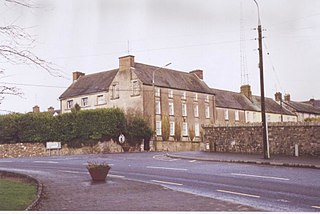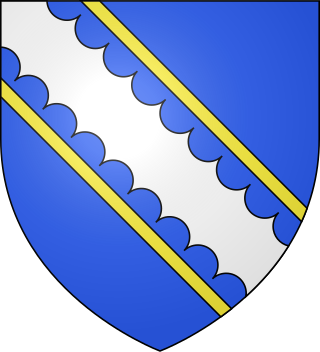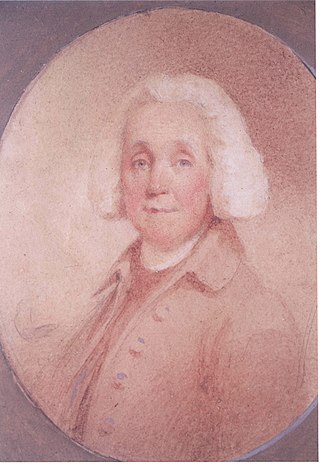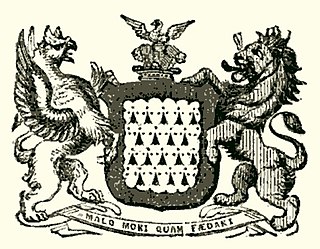Related Research Articles

Baron Bellew, of Barmeath in the County of Louth, is a title in the Peerage of Ireland. It was created on 17 July 1848 for Sir Patrick Bellew, 7th Baronet, who had previously represented Louth in the House of Commons as a Whig and also served as Lord Lieutenant of County Louth. His grandson, the third Baron, was also Lord Lieutenant of County Louth and sat in the House of Lords as an Irish representative peer from 1904 to 1911. He was succeeded by his younger brother, the fourth Baron. He was an Irish Representative Peer from 1914 to 1931. In 1881 Lord Bellew assumed by Royal licence the additional surname of Bryan under the terms of the will of his maternal uncle Colonel George Bryan. However, he is the only one of the Barons to have held this surname. On his death the titles passed to his nephew, the fifth Baron, and then to his younger brother, the sixth Baron. As of 2018 the titles are held by the latter's grandson, the eighth Baron, who succeeded in 2010.

John Foster, 1st Baron Oriel PC (Ire) was an Anglo-Irish politician and peer who thrice served as Chancellor of the Exchequer of Ireland and also served as the last speaker of the Irish House of Commons.

Collon is a village and townland in the south west corner of County Louth, Ireland, on the N2 national primary road. The village is home to the Cistercian Abbey of New Mellifont, and to Collon House, the ancestral home of the Foster family. The village is in a civil parish of the same name.

Baron Clermont is a title that has been created three times, twice in the Peerage of Ireland and once in the Peerage of the United Kingdom. All three creations are extinct. The first creation, Baron Clermont, of Clermont in the County of Louth, came in the Peerage of Ireland on 26 May 1770 for William Fortescue, who was later made Viscount Clermont and Earl of Clermont. For more information on this creation see Viscount Clermont, a title which became extinct in 1829. The second creation came in the Peerage of Ireland on 11 February 1852 when Thomas Fortescue, formerly Member of Parliament for Louth, was made Baron Clermont, of Dromisken in the County of Louth, with special remainder failing heirs male of his own to his younger brother Chichester Fortescue and the heirs male of his body.
Henry Tichborne, 1st Baron Ferrard, known as Sir Henry Tichborne, Bt, between 1697 and 1715, was an Irish peer.

William Foster of Dunleer D.D. was a Bishop of the several parishes in the Church of Ireland.
John William Foster, of Rosy Park, was an Anglo-Irish volunteer and politician.

Anthony Foster of Dunleer, of Collon, County Louth, was an Anglo-Irish politician and judge.

Sir Adrian Fortescue was a courtier at the court of King Henry VIII of England and member of the Third Order of Saint Dominic who was executed in 1539 and later beatified as a Roman Catholic martyr.

William Henry Fortescue, 1st Earl of Clermont, KP, was an Irish peer and politician.
John Thomas Foster of Dunleer, was an Irish politician.
Thomas Henry Skeffington, 2nd Viscount Ferrard, styled The Honourable from 1790 until 1824, was an Irish peer and politician.
William Parkinson Ruxton of Red House in County Louth was an Irish Member of Parliament.

John Barnewall, 3rd Baron Trimleston, was an Irish nobleman, judge and politician. He was the eldest son of Christopher Barnewall, 2nd Baron Trimlestown and his wife Elizabeth Plunket, daughter of Sir Thomas Fitz-Christopher Plunket of Rathmore, Lord Chief Justice of the King's Bench in Ireland and his second wife Marian Cruise. He succeeded his father as 3rd Baron in about 1513. His father, like most of the Anglo-Irish aristocracy, had supported the claim of the pretender Lambert Simnel to the English throne in 1487. After the failure of Simnel's rebellion, he received a royal pardon.

Thomas Fortescue, 1st Baron Clermont of Ravensdale Park in County Louth, Ireland, was an Irish Whig politician and was the historian of the ancient Fortescue family of 12th century Devonshire origins.
The High Sheriff of Louth was the Crown's representative for County Louth, a territory known as his bailiwick. Selected from three nominated people, he held his office for the duration of a year. He had judicial, ceremonial and administrative functions and executed High Court Writs.

John McClintock was an Irish magistrate for County Louth, and formerly Serjeant at Arms in the Irish House of Commons.
Thomas Tennison was an Irish politician and judge. He served as Prime Serjeant and as a judge of the Court of Common Pleas. He sat in the Irish House of Commons as member for Dunleer for many years.
Sir William Aston (1613-1671) was an English-born barrister, politician and soldier, who fought with distinction in Ireland for King Charles I during the English Civil War. Although he made his peace with the Cromwellian regime after the King's defeat, he is believed to have remained a convinced Royalist at heart. He was rewarded for his loyalty to the Crown with a seat on the Irish High Court Bench after the Restoration. His eldest son was hanged for murder in 1686. His last direct male descendant, also named William Aston, was the de jure 6th Lord Aston of Forfar.
Frederick Thomas Hervey Foster (1777–?), of Dunleer, County Louth, was a politician.
References
- ↑ "FamilySearch.org". www.familysearch.org. Retrieved 3 August 2021.
- ↑ Burke's Peerage, see Massereene and Ferrard